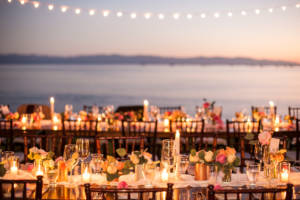3 Ways To Avoid Annoying Your Wedding Guests

Read up on three ways to avoid annoying your wedding guests and ensuring a pleasurable experience for all who grace you with their presence.
Designing your wedding takes plenty of work and planning. It’s a shared effort involving you, your partner, and your vendors, but another party helps make the magic happen: your guests. You may not think of your special day as a collaboration between you and those invited, but they bring atmosphere and expectations to the party. Alienating them is the last thing you want to do, but some couples do things that upset friends and family or that permanently sever relationships. A little thoughtfulness goes a long way, so pay attention to a few common offenses that some nearlyweds commit and that you will want to make sure to avoid.
Guests Spend More Than You Think
Forbes contributor Dani Pascarella reveals that the average wedding guest spends about $430 to attend. That usually includes gifts and attire, but these expenses can double or even triple if the happy couple’s tying the knot out of town. Including travel and accommodations, destination wedding guests spent about $1,440 each in 2019. Pascarella discussed weddings in the United States, but those figures in Canadian dollars work out to $600 spent on local nuptials and $2,000 for destination affairs.
Set a Sensible Dress Code
In a February 2019 Insider piece, Madison Vanderberg retells outrageous tales of horrible wedding demands from entitled ‘zillas. One bride composed a very detailed dress code with colors, hem lengths, and textures, as well as a laundry list of items her female guests were forbidden to wear. Guests already face challenges when choosing what they’ll wear to a wedding, but pressuring them to fit ultra-specific requirements can backfire horribly.
At the same time, you shouldn’t leave your friends and family without any guidance. Wedding Wire Canada’s Alice Prendergast mentions the confusion and panic they may feel if there’s no dress code mentioned in your invitation. She offers advice to help guests figure out what to wear, but you don’t want to put them in that predicament. Vox’s Constance Grady provides a helpful guide to common terms like “black tie” and “wedding casual,” with illustrations to match. If you like, you can even include this or another useful link on your wedding website.
Consider Hosting Your Wedding Locally
Destination wedding guests spend more than half of their total expenses on travel and lodging. Washington Post columnist Michelle Singletary bemoans the steep costs of attendance, but money is not the only issue. On the U.S. version of Wedding Wire, Kim Forrest mentions that 39% of surveyed wedding guests admitted that they didn’t like making travel and accommodations arrangements. People with the luxury of paid time off end up using it on travel, and those without vacation days must choose between attending the wedding and being able to pay their bills.
Between requesting time off, researching prices, and booking transportation and lodging, you may want to avoid the hassle. You can still create a fun and original experience by staying local but choosing a venue, date, and theme that fit your wedding’s vision.
Pay Attention to Ceremony Length
One of your most difficult tasks is selecting which elements to include in your wedding ceremony. You both may desire to customize your vows, incorporate family or cultural traditions, and include special music and readings. At the same time, you don’t want to make your ceremony too long. Brides’ Jaimie Mackey suggests keeping it to 20 or 30 minutes in length. You’ll be able to incorporate meaningful elements without boring your guests or causing them discomfort. Wedding Wire Canada offers some useful guidance for structuring your ceremony.
Designing a wedding can be equally exciting and challenging. It’s a balancing act in which you create an event that both reflects you as a couple and is enjoyable and relaxing for your guests. As you plan your big day, avoid common missteps and remember to practice common courtesy and think of your loved ones’ needs as well as your own.

